Last Saturday evening a teenage girl who lives nearby was walking down Clonavon Terrace, a small residential street around the corner from McDonald’s in the centre of the town of Ballymena, when she was allegedly approached by a pair of 14-year-old boys.
Precisely what happened next remains unclear – and remains the subject of intense debate – but just 48 hours later, and for days to follow, the town in County Antrim would be ablaze after rioting as bad as anything seen since in Northern Ireland since the end of The Troubles.
What we do know – that the two boys are alleged to have sexually violated her against her will in what is thought to be a garage in an alleyway behind Clonavon Terrace – is outweighed by what we don’t: her age, the precise location, her account of what they said and did, the role of a third boy later arrested too.
But one fact is not in dispute: when those two boys – who, unlike the girl, did not grow up locally – appeared on an attempted rape charge at Coleraine Magistrates Court on Monday morning, they were accompanied by a Romanian language interpreter.
This single fact appears to have provided the spark to ignite Ballymena in flames.
As well as The Troubles, the scenes that followed in successive nights of violence also called to mind last summer’s riots across England after the Southport murders.
These had begun with a spontaneous explosion of local outrage over a single incident but soon morphed into violent discontent over immigration generally – as seems to have been the case in Ballymena too.
So how did this small provincial town explode into violence so quickly and to such a shocking extent?
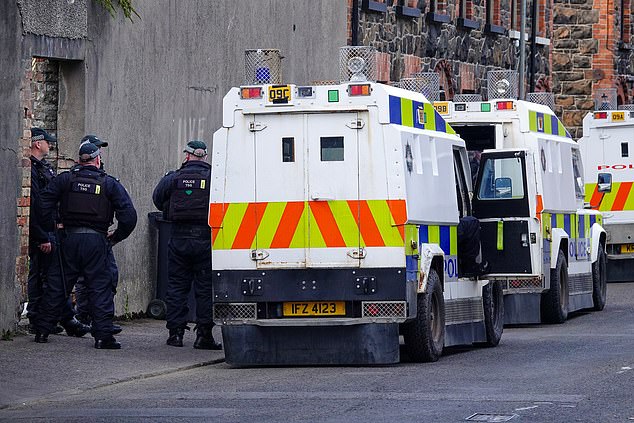
There has been an intensive police presence on Ballymena’s Clonavon Terrace since it was first the scene of a sex attack and then the focus for anti-migrant rioting and arson
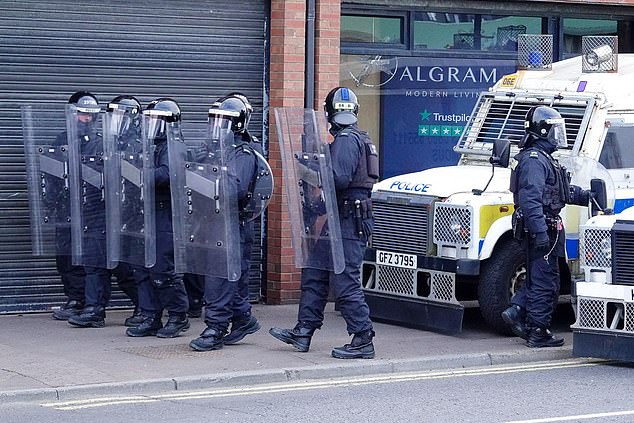
Ballymena’s simmering tensions around a rising population of Roma people exploded on Monday when two 14-year-old boys were arrested for an alleged sex attack on a local girl
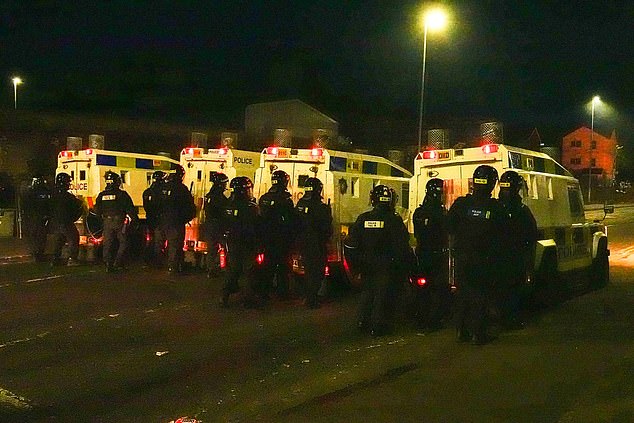
As well as The Troubles, the scenes that followed in successive nights of violence also called to mind last summer’s riots across England after the Southport murders
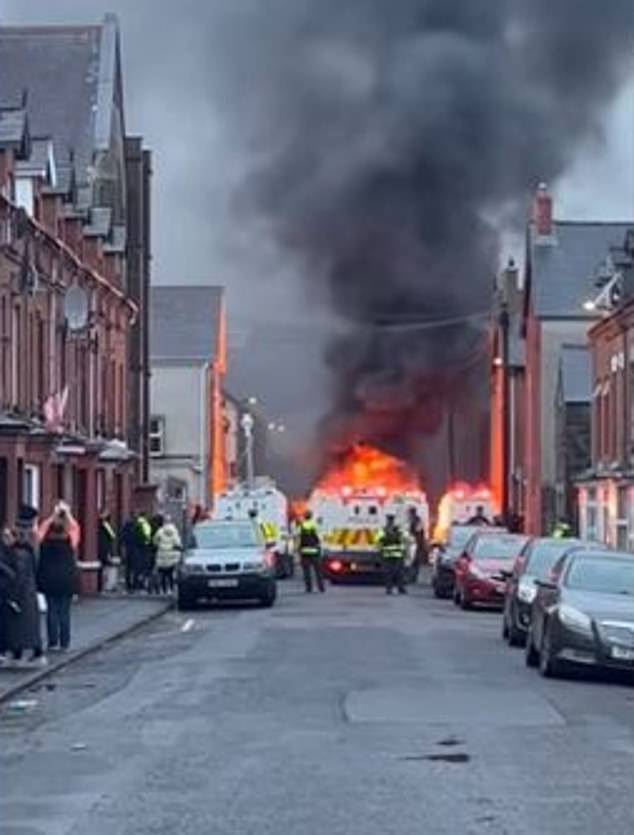
The violence appears to have sparked by an alleged sexual assault, for which two Romanian teenagers have been arrested
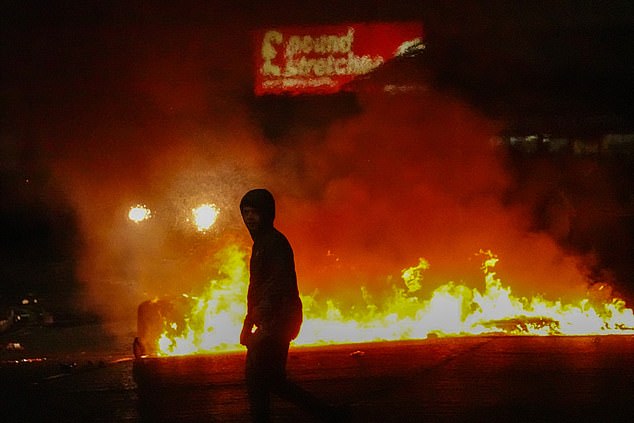
There have been disturbing arson attacks in Ballymena and across County Antrim with homes believed to be rented by migrants set on fire
Within hours of the pair appearing with that interpreter, via videolink from Woodlands Juvenile Centre – where they were then remanded to in custody until July 2 – a Facebook post was being shared hundreds of times locally, purporting to come from the family of the alleged victim.
It read: ‘As a relative of the child who was assaulted at the weekend. I am calling all of the community to come and support my family as we are holding a peaceful protest to show our anger at what cannot and will not be tolerated in this town.
‘I’m aware that not all people with different ethnicity are rapist [sic] or paedos. There is a place for these people in communities to come forward and stand up to these scum in the community. We don’t want everyone getting blamed for this type of action.’
Those who shared this post were predominantly ordinary members of the community in Ballymena.
Typical was local woman Peggy Mccreight who wrote: ‘There’s plenty of people mouthing off about what’s happening to the wee lassies in the town in the last few weeks. Now’s your chance to do something about it.’
A women’s football team, Raceview FC Ladies, cancelled training so that members could attend the march ‘to show support and solidarity with the young girl and her family.’
Others had a loyalist bent. These included The Ballymena Protestant Boys, Ballykeel Bonfire and Ahoghill Loyal Sons of William Flute Band.
And several thousand people duly turned up – estimates range from 2,500 to 5,000 – for the 7.30pm rally starting at a meeting place known locally as ‘Ken’s car park’, in Harryville, just across the River Braid from where the sex attack was said to have happened.
There was then a short march, along Larne Street and Queen Street.
A smaller group then broke off from the main marching group and congregated on the other side of the river, closer to the location of the alleged assault.
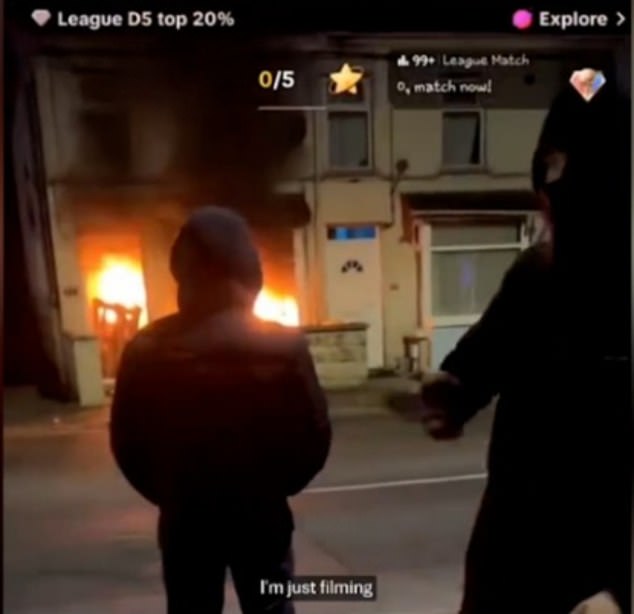
A vehicle burns as PSNI riot squad officers battled protesters throwing projectiles on June 10 in Ballymena

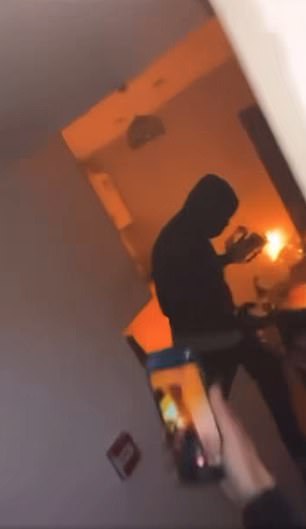
A rioter walks past flames as PSNI officers in riot gear respond to a third night of civil unrest on June 11
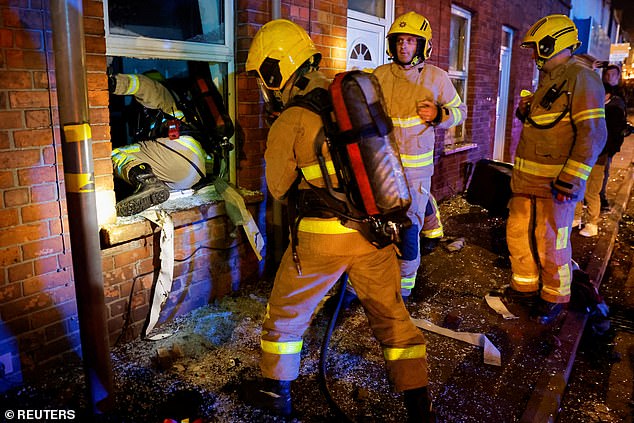
Homes were set on fire, including one thought to be linked to the alleged perpetrators (not pictured)
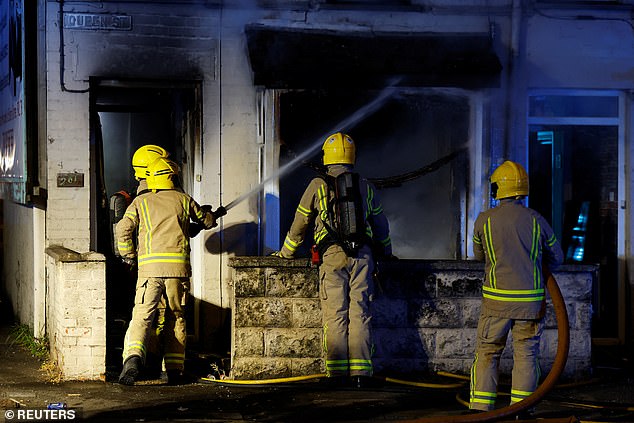
Firefighters work to extinguish a fire started by protesters in a house during a second night of riots
And it was at this splinter protest that violence seems to have started in earnest as youths, most with their faces covered and many wearing gloves despite the warm weather, began to attack a number of houses – and also the police when they tried to intervene. Many more looked on, filming events on their phones.
The homes they targeted were those they believed were housing Roma migrants.
Petrol bombs were thrown and several properties were set alight, including one widely believed to be linked to the two youths who had appeared in court that morning and close to the alleyway where the alleged attack is said to have happened.
After that night of chaos, on Tuesday morning the town began to clear up, assuming that the violence was spent. But it wasn’t. Far from it.
So terrified were residents that many began to hang signs to show that they were not Roma – hanging Union Jacks in the Loyalist area. Even some Filipino residents put up posters proclaiming that they are from the Philippines (and not Romania) to try and protect their homes – although at least one Filipino man still had his car burned out.
‘Locals live here’ quickly became a way to try to protect your home from arson.
So why all this anger and violence? It’s difficult to unpick the truths from the myths in all the angry talk swirling around Ballymena but there are some statistics which perhaps inform any postmortem analysis.
It’s beyond dispute, for example, that over the last 25 years, Northern Ireland has witnessed an unprecedented wave of international migration.
Initially this was primarily from Central and Eastern Europe, but more recently from Africa and Asia too.
Between 2001 and 2023, over 293,000 long-term international migrants are estimated to have arrived in Northern Ireland. This number was offset by the 231,000 who left but it still left a net total international migration flow of 62,000 people – and saw a significant and unmissable shift in the ethnic mix.
The 2021 Census showed that the total number of people belonging to a minority ethnic group stood at 65,600 people – or 3.4% of the population, low compared to the wider UK but still a sea change for the parts of Northern Ireland where they congregated.
That Census also revealed that 124,300 Northern Ireland residents had been born outside the UK and Ireland, 71,200 in Europe and 53,100 in the rest of the world.
Even after Brexit saw the right to free movement that had long allowed eastern Europeans to move to the UK withdrawn in principle, in practice they could still move freely to the neighbouring Republic of Ireland, as it’s still in the EU, and access the UK by the still open land borders.
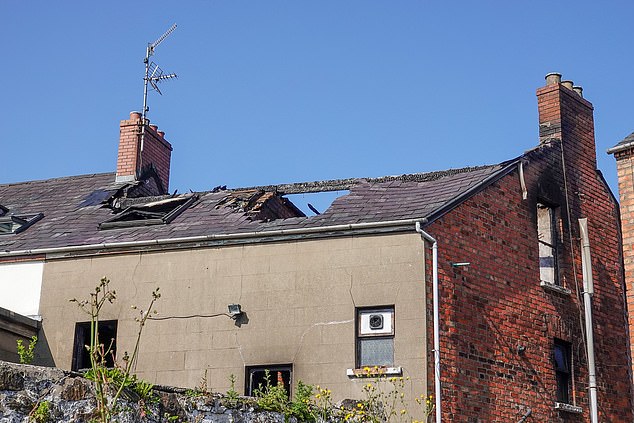
Damage to a house in Ballymena after three nights of rioting in the streets
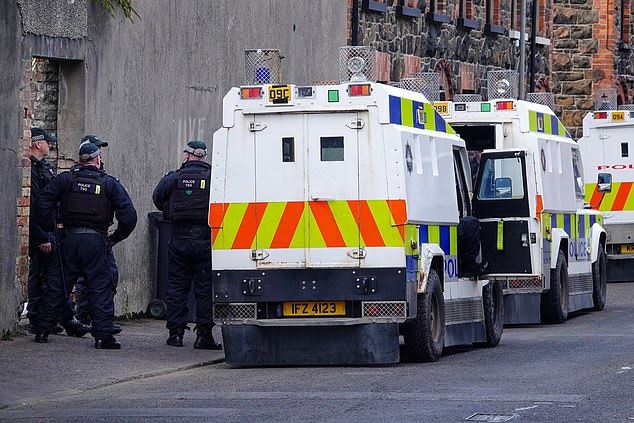
A heavy police presence remains in the town and extra officers have even had to be deployed to Northern Ireland from Scotland
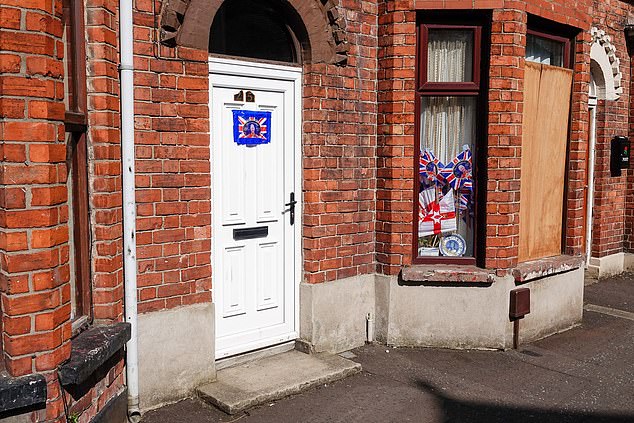
People have put Union Jacks and signs saying they were locals on doors and in windows to try and protect their property from migrant-targeting arsonists
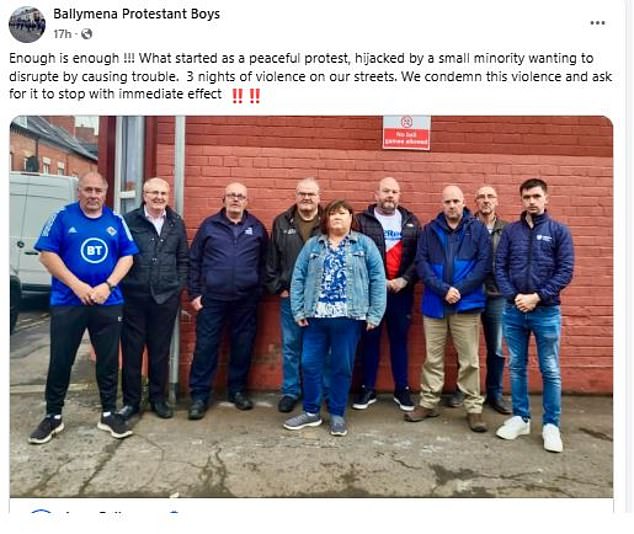
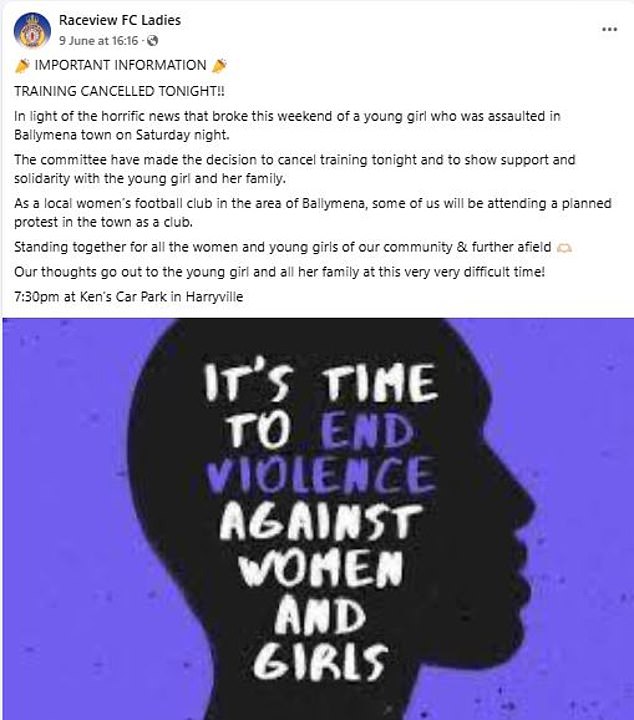
There are no passport controls at the border, only the occasional spot check form the Gardai, the Irish police, so in practice people can cross it freely.
It’s unclear how many if any have done this but the very fact that it’s possible has further stoked resentment.
Ballymena itself is understood to have one of the largest concentrations of Roma people in Northern Ireland with many apparently attracted by jobs at the town’s giant Moy Park chicken processing factory.
And many residents are openly hostile towards incoming members of that Roma community who particularly throng to the small network of streets of Victorian houses around Clonavon Road.
The town generally would hardly be seen as an easy place for outsiders to attempt to settle.
Situated in County Antrim, 25 miles northwest of Belfast, Ballymena, population 31,000, was where notorious Unionist firebrand Ian Paisley grew up.
And his spirit lives on, with Union Jacks and posters of the royal family decorating many houses in Ballymena long before the riots, and expectation building ahead of the annual marching parade season, which starts next month.
The region has even been described as Northern Ireland’s equivalent of the US Bible Belt, where Protestantism is the dominant religion and ‘drugs, the Devil and debauchery’ are abhorred.
At street level the responses to the societal shift that migration has brought have been more typically emotive, echoing the famously unequivocal Reverend Paisley.
MailOnline found no shortage of locals insisting they were not racist, but blaming Roma people for everything from anti-social behaviour to causing an increase in the price of rental homes and difficulties in getting GP appointments.
Several claimed that more than two thirds of the terraced homes around Clonavon Road are now occupied by immigrants – particularly citing Roma families from Romania or Bulgaria.
A relative of the alleged victim pointedly told MailOnline how she came from a ‘long established’ and extended ‘hard working’ family in Ballymena.
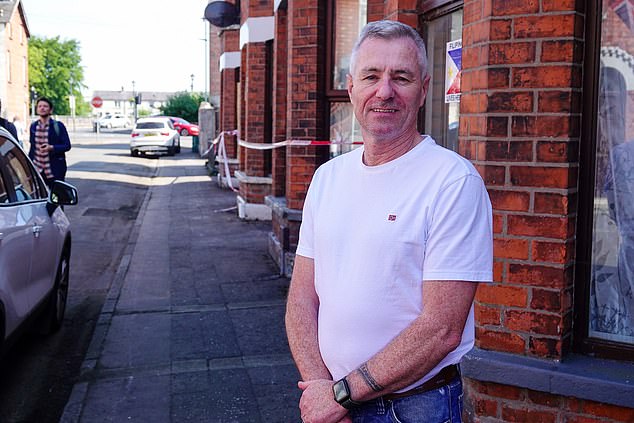
Lawrie Philpott, 59, a DUP councillor in Ballymena, condemned the violence, but insisted the protests erupting in the town were not racist
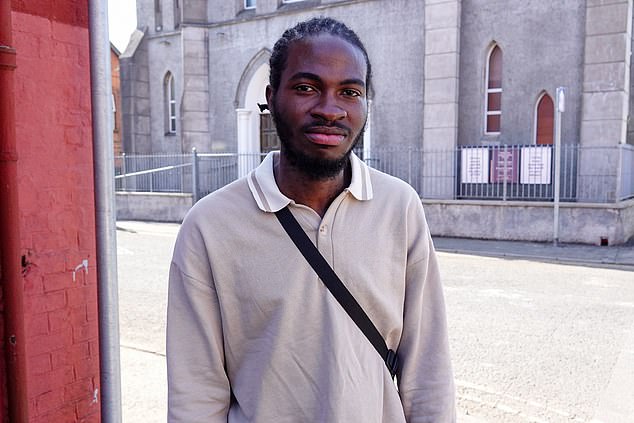
Nigerian-born Toby Adeyemi, 26, who is a support worker for people with disabilities, insisted that the Clonavon Road area was ‘a relatively peaceful and friendly neighbourhood’
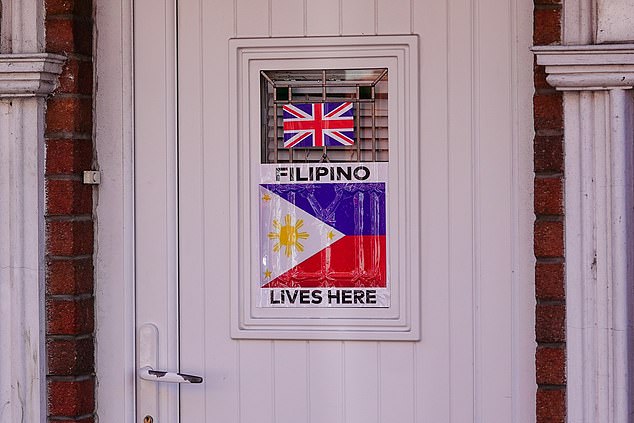
Jhonsen Fabros, 26, told how he has put a sign on the front door, saying those inside were Filipino, to try and protect their home from rioters who are targeting Roma people
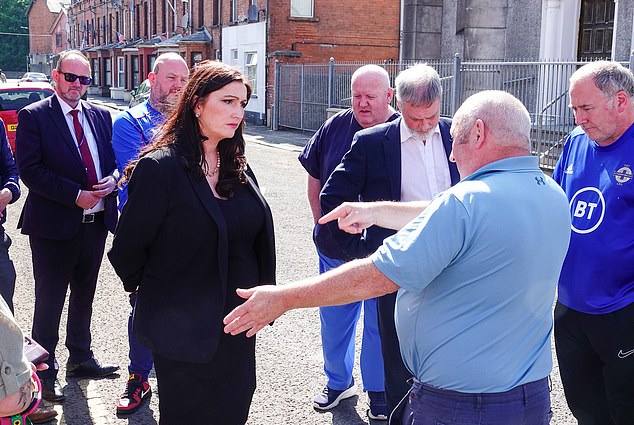
Riot police patrol the streets of Ballymena as they prepare for further violence
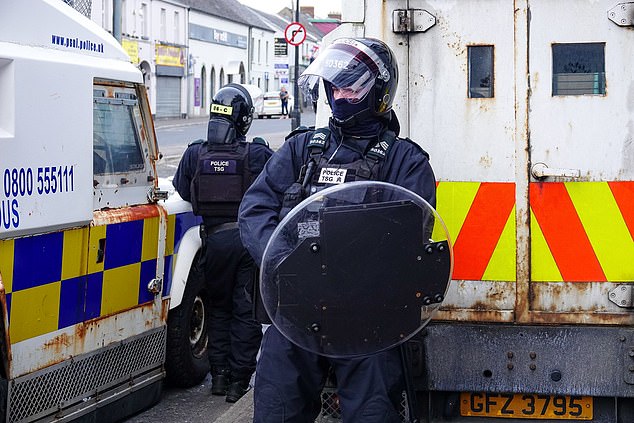
Hundreds of officers are being deployed around Northern Ireland to try and restore peace
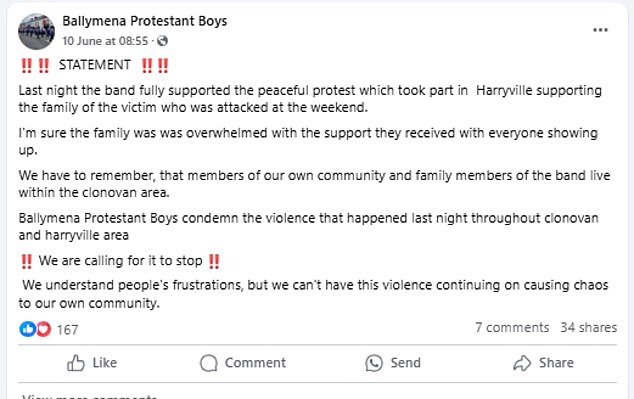
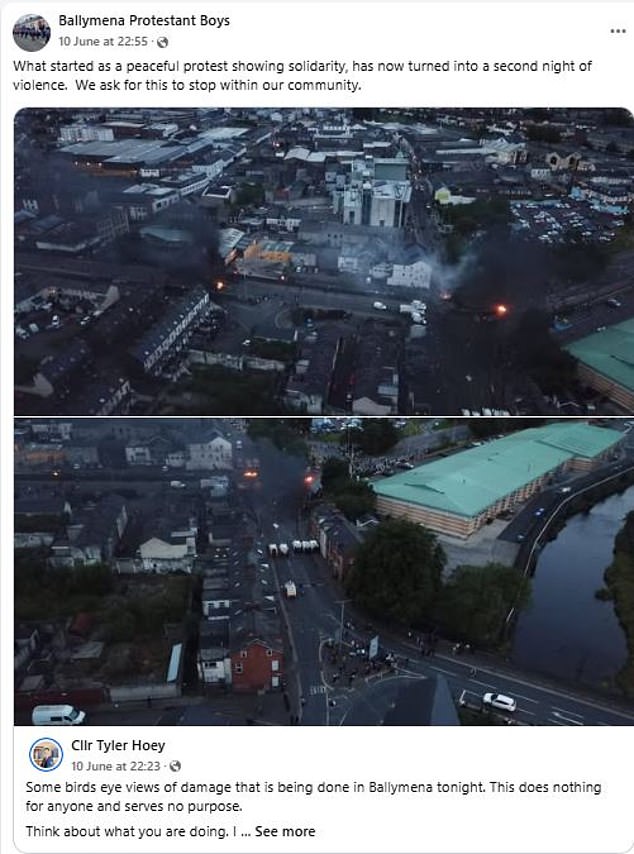
Others spoke of the incident being the third alleged sex attack in recent weeks including another one on a girl aged 13 and made unsubstantiated claims about Roma people drug dealing and running brothels in the area.
A post attributed to a local teenage girl, also shared widely on Facebook, spoke of feeling sexually intimidated by the presence of Roma people in the town.
It read: ‘As a 16-year-old girl who has lived the majority of my life down here were [sic] the Roma gypsies are also living, I can’t even walk up to work in broad daylight without feeling uncomfortable and intimidated.’
The circulation of this kind of febrile material seems to have provided the oxygen to fan the flames that kept the town burning all week.
But unlike last summer’s riots in England, which spread from Southport to numerous towns and cities, there were no asylum seekers in hotels to act as a focus for anger.
The nearest one to Ballymena was the Loughshore Hotel more than 20 miles away in Carrickfergus, but even that ceased being used for migrants in June last year.
So it seems that here, at least initially, individual homes were the target – until a more obvious target emerged.
As police condemned the initial unrest as ‘racist thuggery’ and local politicians appealed for calm, an undisclosed number of migrant families, including many with children fled their homes in the area, many heading to the leisure centre in Larne, some 20 miles away.
The council insisted in a statement that it had set up the refuge ‘in line with normal protocols and in collaboration with local agencies’ to ‘provide emergency shelter for families in urgent need following disturbances in Ballymena’.
But as word spread about the use of a public leisure facility to provide that shelter, anger in some quarters intensified further as social media users accused the council of misusing resources.
A demo was scheduled to take place outside that leisure centre on Wednesday evening.
Again this was co-ordinated on a Facebook group page yesterday called ‘Larne anti-immigration protests’. This has now been removed.
And that is probably because the demo turned very quickly to even worse violence: a mob smashed windows of the leisure centre and set fire to it.
By now the riots were beginning to appear better organised – and more carefully recorded. Some were even live streaming the violence on TikTok.
And those involved in discussing all this online now seemed more reminiscent of The Troubles and of the violence that has long flared up around controversial loyalist summer marches.
These included self-styled ‘pastor’ Clifford ‘Cliff’ Peeples, a well-known loyalist extremist. Other self-described ‘citizen journalists’ shared incendiary content in the same vein.
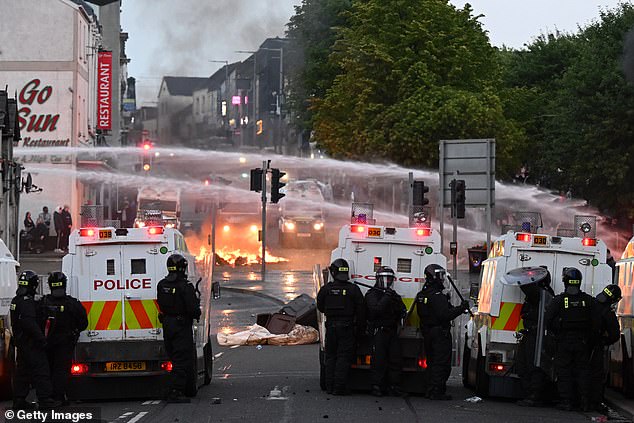
Police use water cannons during protests on June 10 in Ballymena
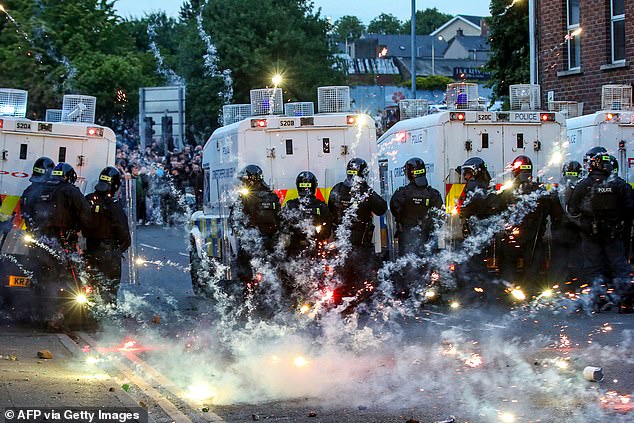
Fireworks thrown at Riot Police illluminate the road during a thrid night of anti-immigration demonstrations in Ballymena, Northern Ireland
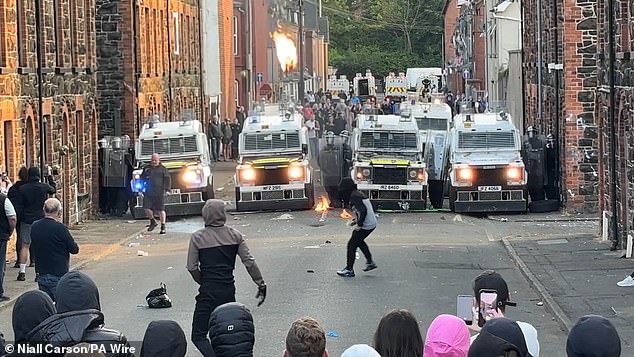
PSNI vehicles form a barricade as they face off with rioters on the streets of Ballymena
A new private Facebook group, calling itself Ballymena Reaction Group, posted ‘This group was formed due to the lack of action taken by the authorities, in relation to information they have received about the Roma gangs in Ballymena involved in, human trafficking, drugs and prostitution.’
The fate of those on the receiving end of this bigotry and violence has been terrifying and grim in equal measure.
As MailOnline reported yesterday, one Romanian resident of Ballymena had apologised after his ‘boast posts’ had apparently led to him and his family being targetd.
The man, named Alex, had filmed himself in a series of boorish and defiant social media posts, including one where he blew kisses and waved money on camera. In another he appeared dismiss his Audi being destroyed by rioters, suggesting he could simply replace it.
But after his family and his home came under attack this week he had had an apparently terrifing encounter with the mob.
Berchi said he had been questioned by police in connection with the rape and then released without charge.
He explained that he had been only caught up because of mistaken identity – apparently partly because of the presence of a Romanian interpreter.
‘I was filmed against my will and posted on social media,’ he wrote. And he said that soon his family felt under siege.
‘My wife being scared sent my mother and the two little girls to the country (Romania) because they had threatened to break in and kill them.
‘Shortly after I arrived at my home in Ballymena I heard knocking on doors and windows. Screams with indescribable threats. I got scared I didn’t know what was happening I wanted to leave my home but I couldn’t I was surrounded by people.’
To escape, he said, he had to ‘do something taken from the movies’.
‘I climbed into the attic I broke the roof and I came out through the back of the house…’
‘My wife and my little girls were traumatized as well as the rest of the family. I was verbally assaulted, humiliated – me and my whole family.’

Alex, a 28-year-old father-of-two, has revealed he was arrested by police but later released without charge. He says his home and property has been destroyed by rioters
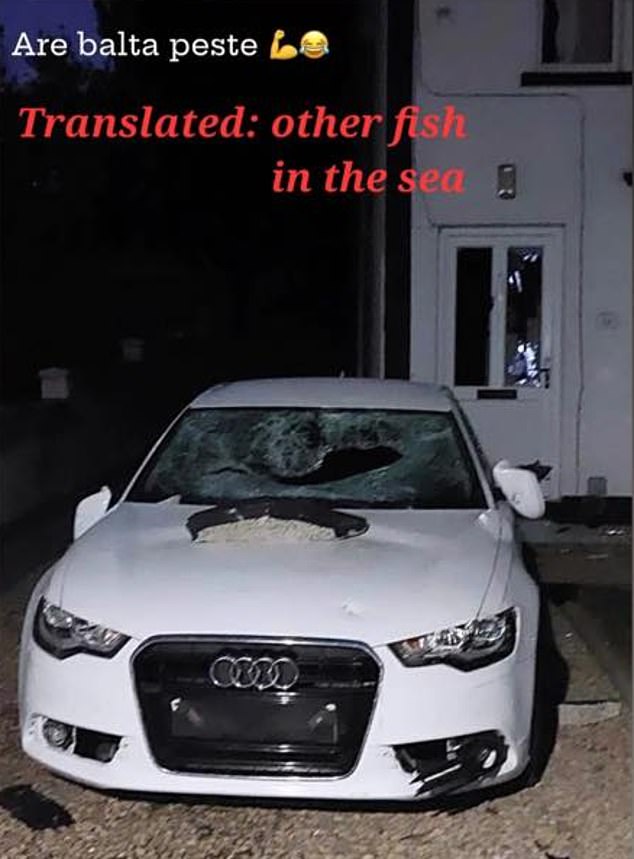
Alex’s Audi was destroyed on his drive and his home attacked twice
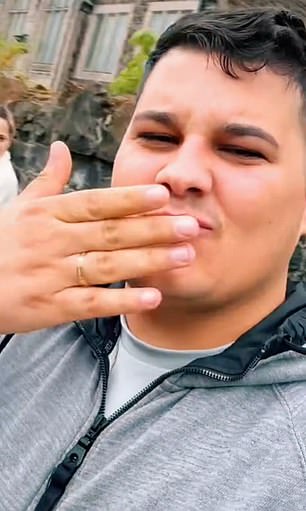

He has apologised about a TikTok video where he blew kisses and waved money outside Ballymena courthouse
Pleading for his persecution to stop he went on: ‘My family and I are not guilty, we all came for a better life, no one wants problems, we are modest people, people who fear God.
‘I have been living in the UK since 2016 since then I have a job…I lost everything because of false accusations, I lost my house where I lived, my car, all my belongings. But the biggest regret is that I lost the chance to offer my children a better future. And all this without my having any fault.’
Apparently moved by pleas of this kind, the family of the girl who was allegedly sexually assaulted by the end of the week had issued a plea for the violence to cease.
And Northern Ireland police chief Jon Boutcher said the young girl had been ‘further traumatised’ by the rioting.
MailOnline was present for some of the rioting on Wednesday night.
We witnessed petrol bombs, fireworks, bottles, bricks, smoke bombs, lumps of concrete and even dinner plates being hurled by masked youths at police sheltering behind shields beside riot vans lined across the road in Ballymena.
Officers used baton rounds, dogs and water cannon to help disperse the crowd while police drones flew overhead, and prevented the mob from targeting any more homes in the Clonavon Road area.
And we spoke to many of those present.
Retired shop manager Ken Taylor, 69, who has lived in Ballymena all his life and was watching the crowd before violence erupted, told MailOnline: ‘People have just got so angry at how this town has changed.
‘It has been a pot waiting to boil over for a long time and what happened to this girl was the last straw. We have had Polish, Albanians and all sorts of people moving into the town and most have settled into the community.
‘They all like living together, and a lot have settled in the Clonavon Road area. When a local family moves out, they become the next tenants. Soon, it will be 100 percent Romanian.’
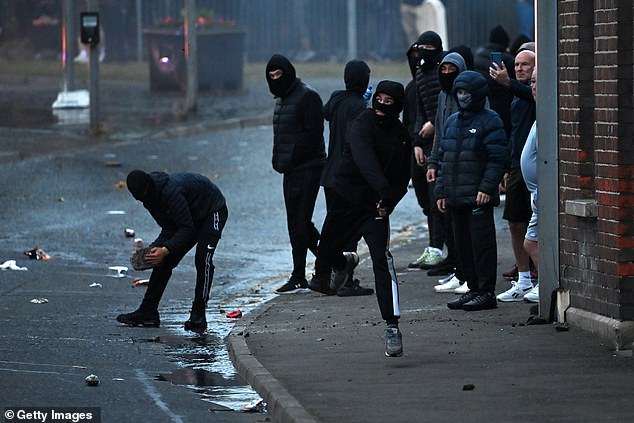
Protesters throw projectiles and start fires as unrest continues on June 10
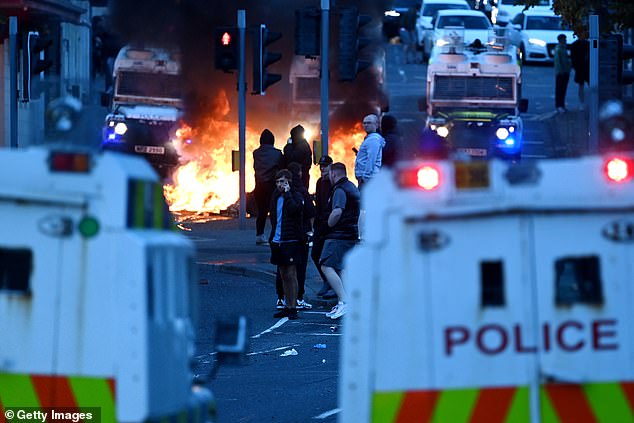
A fire is seen burning in Ballymena after rioters set objects alight in the street
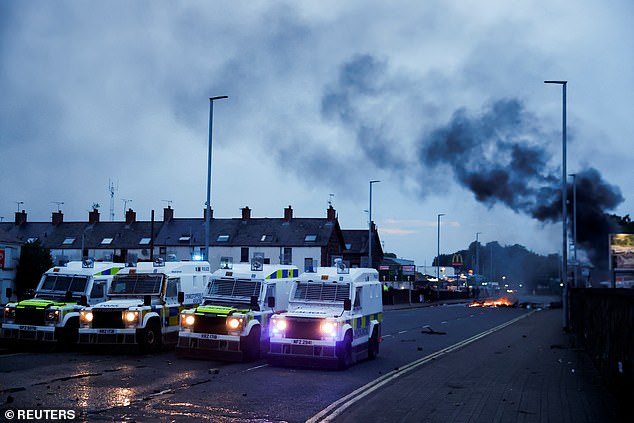
Police vehicles are parked as flames rise during a second night of riots, in Ballymena, Northern Ireland, June 10
Another resident said: ‘What makes it worse is that you get so many of them living in the same house. They have beds crammed into every room. It means the private landlords can charge them more.
‘But it pushes up the rental prices in the town for everyone else which creates more issues.’
Child-minder Victoria Scott, 42, who grew up in Ballymena and now lives nearby said she had joined the protesting crowd last night to show solidarity with people concerned about sex attacks.
She said: ‘The arrival of so many immigrants has changed the town so much. You have problems getting a GP or hospital appointment now and you can’t get a dentist. Schools get over-subscribed because there are so many Roma kids and they need translators in class.
‘A lot of the adults don’t work. They sit out on sofas in front of their houses and spit at you, and the housing market gets over-subscribed so people can’t get enough homes.
‘I grew up being able to happily walk home from pubs and clubs at 1.30am or 2am. But if I was a young woman now, I wouldn’t want to go out alone.
‘You get foreign nationals running their trolleys over you in the supermarket – but then you have mostly foreign NHS staff working in the hospital, and they are wonderful.
‘I don’t agree with the violence at all, and I even took a plate off a young boy tonight before he could throw it at the police.’
Speaking on Wednesday afternoon Lawrie Philpott, 59, a DUP councillor in Ballymena, condemned the violence, but insisted the protests erupting in the town were not racist.
He said: ‘It’s not racial. People just feel as if there is nowhere else to go at the minute. There have been issues in this area with newcomers coming in. People are angry.
‘For instance we regularly see them throwing out rubbish bags, but maybe that’s because they come from a culture where there are no regular rubbish collections.
‘When you have newcomers coming in, they need to be educated in some way about our culture and we also need to be educated about them. We need programmes to help people fit in.
‘The family of the girl has called for the violence to stop, and that should happen. We have to remember that they are human beings. At the moment, we have mob rule and we have to nip it in the bud.’
Mr Philpott said he blamed a lot of the anger on a lack of housing in the town, and ‘profiteering’ by landlords.
He said: ‘They are getting top dollar for rents because of all the migrants moving in. I know an Army veteran aged 71 who is having to move because his landlord is selling up, but he is being quoted £1,000 a month for a place to live. He just can’t afford it.
‘The claims of racism here are not real. It could easily have happened in another area (without a Roma population), and there would still be protests, which could probably turn into violence.’
MailOnline also spoke to a group of Filipino migrants among a group of nine working at the Wrightbus factory in Ballymena and living for the last two years in a five-bedroom house in Clonavon Terrace, just a few doors down from the fire-gutted house.
Jhonsen Fabros, 26, told how they had put a sign on the front door, saying they were Filipino, to try and protect their home.
He said: ‘We are scared after what happened. We have no idea if it is going to carry on, but so far we have not had any aggression. We like living here.’
Nigerian-born Toby Adeyemi, 26, who is a support worker for people with disabilities, insisted that the Clonavon Road area was ‘a relatively peaceful and friendly neighbourhood’.
He said: ‘Kids come out to play here. People bond, and we share drinks with neighbours. I am friends with Bulgarians and Romanians, and there are Polish people as well. I am trying to protect our street from violence. It is very sad.
‘They are mostly teenagers causing problems. I think they are being groomed on social media. They are just being unruly.’
But what Ballymena has witnessed this week is more than mere unruliness. And it remains to be seen how this will end.












